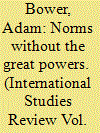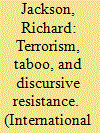|
|
|
Sort Order |
|
|
|
Items / Page
|
|
|
|
|
|
|
| Srl | Item |
| 1 |
ID:
141291


|
|
|
|
|
| Summary/Abstract |
International Relations (IR) theorists have traditionally viewed rationality and consciousness as defining features of human behavior. But recently this approach has come under fire from several angles. Not only do many psychologists now consider rationality to be dependent on emotions, recent developments in the logics of action debate in IR theory explicitly argue for de-emphasizing the role of consciousness and rationality in theorizing agency. In an effort to put rationality back into its proper place, we critique two recent contributions to the logics of action debate: practice theory and the logic of habit. Both logics of action are useful in many respects, but we argue that they rest on a view of individual agency that is too structural and insufficiently cognitive to fully understand how individuals make decisions in international politics. We do not doubt that unconscious reflexes often control individual decisions, but we maintain that cognitive control and deliberation play a much larger role in constructing these reflexes than practice theory and the logic of habit recognize. We sketch a rational intuitionist logic of action for IR theory. We argue that intuitions constitute the most useful way to theorize the unconscious determinants of individual action and that although intuitions control how people behave in particular circumstances, they are subject to rational recalibration through internal and intersubjective reasoning.
|
|
|
|
|
|
|
|
|
|
|
|
|
|
|
|
| 2 |
ID:
141288


|
|
|
|
|
| Summary/Abstract |
In the past two decades, a series of major multilateral treaties were created in the absence of support—and often in the face of sustained opposition—from the United States and other emerging global leaders like China, India, and Russia. These institutions present a puzzle to prominent theories of IR because they fail to encompass predominantly powerful actors regarded as most consequential to the development and enforcement of international rules, raising questions as to their potential efficacy. This paper addresses the prospects for non-great power law in theoretical and empirical terms. I first draw on constructivist conceptions of international law as a social practice to demonstrate how multilateral treaties may generate powerful new social expectations and alter behavior even when they do not correspond to the prevailing distribution of material power in the international system. Treaties are embedded within an international social system composed of legal and non-legal elements, and these structural features generate social pressures that bear on formal members and non-parties alike. I then apply this account to an archetypal—and hard—case, the ban on antipersonnel mines. Contrary to skeptical assumptions, I demonstrate that the Mine Ban Treaty has instantiated a powerful new international social standard which has generated widespread behavioral change among treaty members—challenging accounts that emphasize enforcement by leading states—and non-parties including major military powers like the United States—challenging the view that great powers avoid new institutional developments not to their liking.
|
|
|
|
|
|
|
|
|
|
|
|
|
|
|
|
| 3 |
ID:
141289


|
|
|
|
|
| Summary/Abstract |
Resilience has gained substantial traction in international politics of late. This scholarship has sparked debates concerning the meaning of resilience and how scholars should go about studying it. Scholars attuned to Michel Foucault's governmentality thesis argue that resilience is a product of contemporary neoliberalism and constitutes a strategy permitting states to abdicate responsibility in times of crisis. The overarching objective of this article is to tell a different sociopolitical story of the connections between resilience and international politics. In mapping International Relations (IR) scholars working on resilience, the gist of the argument presented here is that although resilience may be in some instances a neoliberal device for governance, it has a wider range of meanings as well. By setting out a different narrative of resilience, this article opens the possibility of an analysis that sees the emergence of resilience in international politics holding great promise for renewing and deepening current IR debates, including securitization, international interventions, vulnerability, resistance, and the political use of myth.
|
|
|
|
|
|
|
|
|
|
|
|
|
|
|
|
| 4 |
ID:
141292


|
|
|
|
|
| Summary/Abstract |
The concept of civilization has played a central role in the work of the English School. Yet, most English School scholars concern themselves with the role of civilization in defining the relations between the members of international society. The Standard of Civilization stands as a case in point, for most English School scholars have examined this legal principle with reference to its role in defining membership in the society of states. This paper sets out to help us understand the role of the Standard of Civilization in defining relations between state and nonstate societies at the beginning of the twentieth century. It analyzes the Standard of Civilization and its role in defining Indigenous-state relations and presents a case study analysis of Chief Levi General's diplomatic mission to the League of Nations on behalf of the Six Nations. The paper concludes with a discussion of the implications of its analysis for the theory and practice of IR, as well as the English School and its analytics.
|
|
|
|
|
|
|
|
|
|
|
|
|
|
|
|
| 5 |
ID:
141290


|
|
|
|
|
| Summary/Abstract |
More than a decade of the war on terror has increased levels of direct and structural violence and strengthened the forces of political oppression across the globe. Within this historical material context, as well as the intellectual context of the “narrative turn” and the wider “cultural turn” currently underway in International Relations, this article explores the ways in which the terrorism novel might act as a mode of discursive resistance or literary resistance to these (oppressive) forms of power, as a site of emancipatory agonistic politics, and as a social scientific method of analysis. Among possible forms of discursive resistance, the novel—as a narrative mode—has genuine potential due to its affective as opposed to confrontational form, its engagement with the emotional aspects of international politics, its lack of conventional boundaries, and its potential reach. However, to date, the terrorism novel has not realized its potential as a mode of resistance, but has instead tended to reinforce the counterterrorism truth regime by reinforcing and maintaining the modern terrorism taboo. In this respect, the publication of Confessions of a Terrorist: A Novel (Jackson 2014) represents something of a watershed, as it is one of the first sympathetic fictional depictions of a terrorist and the first to give primary voice to the perspective of the terrorist. Allowing the terrorist to speak not only acts to resist and undermine the terrorism taboo and generate empathetic projection, but potentially also creates an agonistic moment in which the violent subaltern can speak on an equal footing directly to the counterterrorist—and by extension, to the reader. The article concludes by reflecting on the potential of the novel as a site of both resistance and agonistic encounter and the challenges of employing literary resistance to domination.
|
|
|
|
|
|
|
|
|
|
|
|
|
|
|
|
|
|
|
|
|